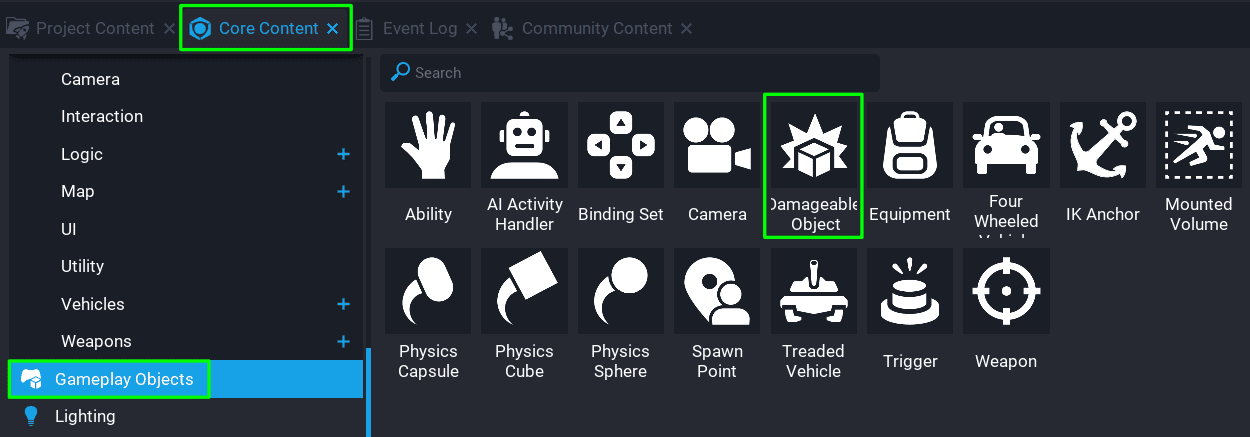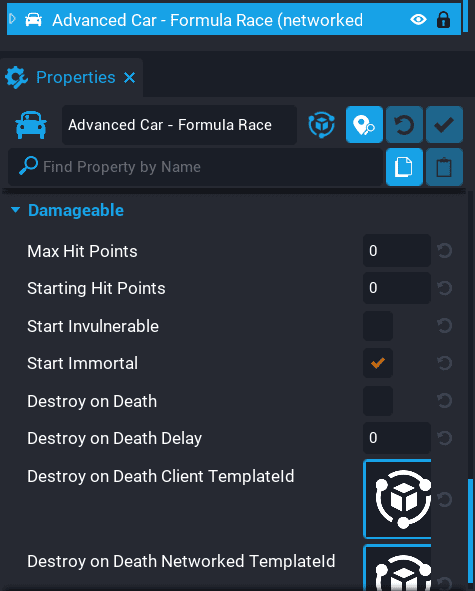Damageable Objects
Overview
The Damageable Object is a Core Object that implements the Damageable interface and has properties, events, and functions for objects which can take damage and die.
The Damageable Object streamlines damage and destroying objects. Children of a Damageable Object that are hit by a projectile (or another damage source), will look for an ancestor that is a Damageable and automatically deduct the damage from health of the Damageable. Creators can control what happens when the health of the Damageable Object reaches 0 through the DamageableObject type in the Core Lua API.
A benefit to Damageable Objects, is no scripting is needed to damage an object and destroy it. This can all be controlled from the custom properties, which makes it quick and easy to setup.
Use Cases
There are many use cases for the Damageable Object. Here are a few examples of how the Damageable Object could be used in a game.
-
Breakable Objects
Some games have objects that can be broken and reveal loot for the player. For example, setting the property Destroy on Death to spawn breakable containers, like crates or pots.
-
Dummy
The dummy object that has the Start Immortal property enabled, can be used to return the amount of data the weapon or projectile does, without being destroyed.
-
Enemy AI
An enemy that is immune to damage until the shield has been destroyed. By using nested Damageable Objects, the parent Damageable Object has the property Start Invulnerable enabled, and then disabled after the child Damageable Object is destroyed.
Here is an example of an NPC (Non-Player Character) that has a drone blocking the damage. The Damageable Object for the NPC has the property Start Invulnerable enabled. After the drone Damageable Object is destroyed, the NPC Damageable Object has the isInvulnerable property set to false.
See the Damageable Object API for further examples.
Where to find Damageable Object
The Damageable Object can be found in Core Content, under the category Gameplay Objects.
Networked Damageable Object
By default, a Damageable Object that is placed into your Hierarchy will be networked. This means it will have collision, and server side gameplay. In most cases, especially when creating AI Enemies that the player can damage, the Damageable Object will be networked.
Client Only Damageable Object
A Damageable Object that is client only (that is placed into a Client Context), has no collision. Which means it cannot be hit by a weapon or projectile. Damage can still be applied to the Damageable Object from a client script.
ApplyDamage(Damage) can also be used on the client to apply damage to the Damageable Object.
The Damageable Properties
The Damageable Object uses the Damageable interface that unifies health, damage, and death behavior with players and some objects (that is Vehicles, Physics Shape). Below are the properties of the Damageable interface that can be found on a few different objects in Project Content.
| Property Name | Description |
|---|---|
| Max Hit Points | Maximum hit points of the object. Values less than or equal to 0 will be ignored. |
| Starting Hit Points | The hit points of the object when the object is spawned. Cannot be greater than Max Hit Points or less than 0. |
| Start Invulnerable | When true, the object cannot take damage. |
| Start Immortal | The object doesn't automatically die when the hit points is less than or equal to 0. |
| Destroy on Death | If true, when the object dies, destroy the object. |
| Destroy on Death Delay | Time, in seconds, after the object dies when it will be automatically destroyed if Destroy on Death is true. |
| Destroy on Death Client TemplateId | Spawns the template on the client at the location of the Damageable after the death delay. This is the most efficient for visual-only effects. |
| Destroy on Death Networked TemplateId | Spawns a networked template at the location of the Damageable after the death delay. This is useful for spawning gameplay from a destroyed Damageable. |
See Damageable Object API for information and examples.
Objects that Implement Damageable Interface
Some objects implement the Damageable interface that allows for it to receive health, damage, and death behaviour. Damageable Objects have hitPoints and maxHitPoints properties in the Damageable category of the object Properties window.
Below is a list of some of the objects that implement the Damageable interface.
Vehicle and Physics Object will default to Start Invulnerable.
Learn More
DamageableObject | Damageable | Damage | AIActivity | AIActivityHandler | Vehicles

